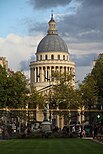Lomercoyne
Lomercoyne
Fasburdas Lomercoyne | |
|---|---|
 Boundaries of the Federal Capital District, a.k.a Greater Lomercoyne (green) | |
 Location of Lomercoyne in the Northern Kingdom (red) | |
| Sovereign state | Chatten and Leucen |
| Nation | Leucen |
| Island | Leucen |
| Federal district | Federal Capital District |
| Administrative HQ | Horessen Palace |
| Government | |
| • Type | Mayor-council government and deliberative assembly |
| • Body | Greater Lomercoyne Development Authority |
| • Mayor | Jayer Inseignia (SDPC) |
| Area | |
| • Total | 1,844.07 km2 (712 sq mi) |
| • Urban | 2,025.37 km2 (782 sq mi) |
| • Metro | 9,163.37 km2 (3,539 sq mi) |
| Population (2020) | |
| • Total | 11,546,332 |
| • Rank | |
| • Density | 5,640/km2 (14,600/sq mi) |
| • Urban | 9,332,435 |
| • Metro | 16,712,334 |
| Demonym | Lommies |
| Time zone | UTC+1 (NWT) |
| • Summer (DST) | UTC+2 (CDT |
| Area code | +115 |
| Geocode | .lomercoyne |
| Website | lomercoyne.gov.ch |
Lomercoyne, formally the City of Lomercoyne, nicknamed the "City of Stars" and commonly known as Lommy, is the capital city located in the Federal Capital District of Chatten and Leucen. The city is conveniently located between the federal states of Paworys and South-west Leucen. Situated on the River Cymon, the longest river in Great Chalcain, its access to the Crowergynn Sea through Cymon makes it a continuously inhabited settlement for 2,500 years. Its ancient core, commonly called the Lomerynum, was originally the approximate location of an indigenous city inhabited by a Chalcerean tribe known as the Leucyn. It serves as the historic and contemporary capital of the country, from the period of Tridetarchy when it serves as the capital of Leucen, during the rule of the Moravs when it became the administrative center of Moravian Leucenia, and through-out medieval and contemporary history. Serving as the home of the government and the Parliament for a millenia, the city bears the status as the political, financial, cultural, and technological center of the Northern Kingdom. Lomercoyne grew rapidly during the Turembelian, Nethanian, and Crowberwynnian eras, quickly recovering from the disastrous Constitutional Revolution of 1801. It plays a significant role on the rise of liberalism during the Century of Revolutions and the 1935 July Revolution. Briefly becoming the largest city on Callys during the 19th century, its expansion led to the absorption of surrounding counties such as Sharram, Tremmen, and Cywun. By 1975, the city gains a total of 33 districts, necessitating the formation of a federal district. Both the federal district and the administrative region is governed by the Greater Lomercoyne Development Authority.
As one of the world's global cities, Lomercoyne exerts enormous influence in world's art, commerce, transport, science, media, finance, education, healthcare, entertainment, fashion, technology, tourism, and communications. As a member of the Callyssian Network of Capital Cities, Lomercoyne is among one of Callys' economically powerful cities and one of the world's financial centres, with the earliest stock exchange established in Lomercoyne in 1511. It hosts Callys' largest concentration of higher educational institutions, some of which are the highest-ranked educational institutions in the world: Crowberwynn University of Institute and Technology for STEM studies, Lomercoyne School of Economics for business and economics, Metropolitan University for fine arts, literature, and philosophy, and the comprehensive University of Lomercoyne, one of the oldest universities in the world. It has the world's second busiest airport and is home to the world's oldest rapid-transit system.
Lomercoyne's urban culture encompasses many languages. It is the most populous city in the Northern Kingdom, with its metropolitan area having the total population of 16 million inhabitants, making it a megacity. One-fourth of the population of the island of Leucen and approximately 17% of the entire population lives in this city. Three World Heritage Sites are located in Lomercoyne: the gardens and plazas surrounding Horessen Palace; The Septium and its vicinity, Cemetery of Kings, the surviving parts of Wall Rygusta, and Moravian Bathhouses; Bridge of Lomercoyne; and Reiro's Monument. Other landmarks include The Wheel, Cydacyll Avenue, Jark Syde Park, Metropolitan Museum of Fine Arts, and the numerous theaters at Sojo.






